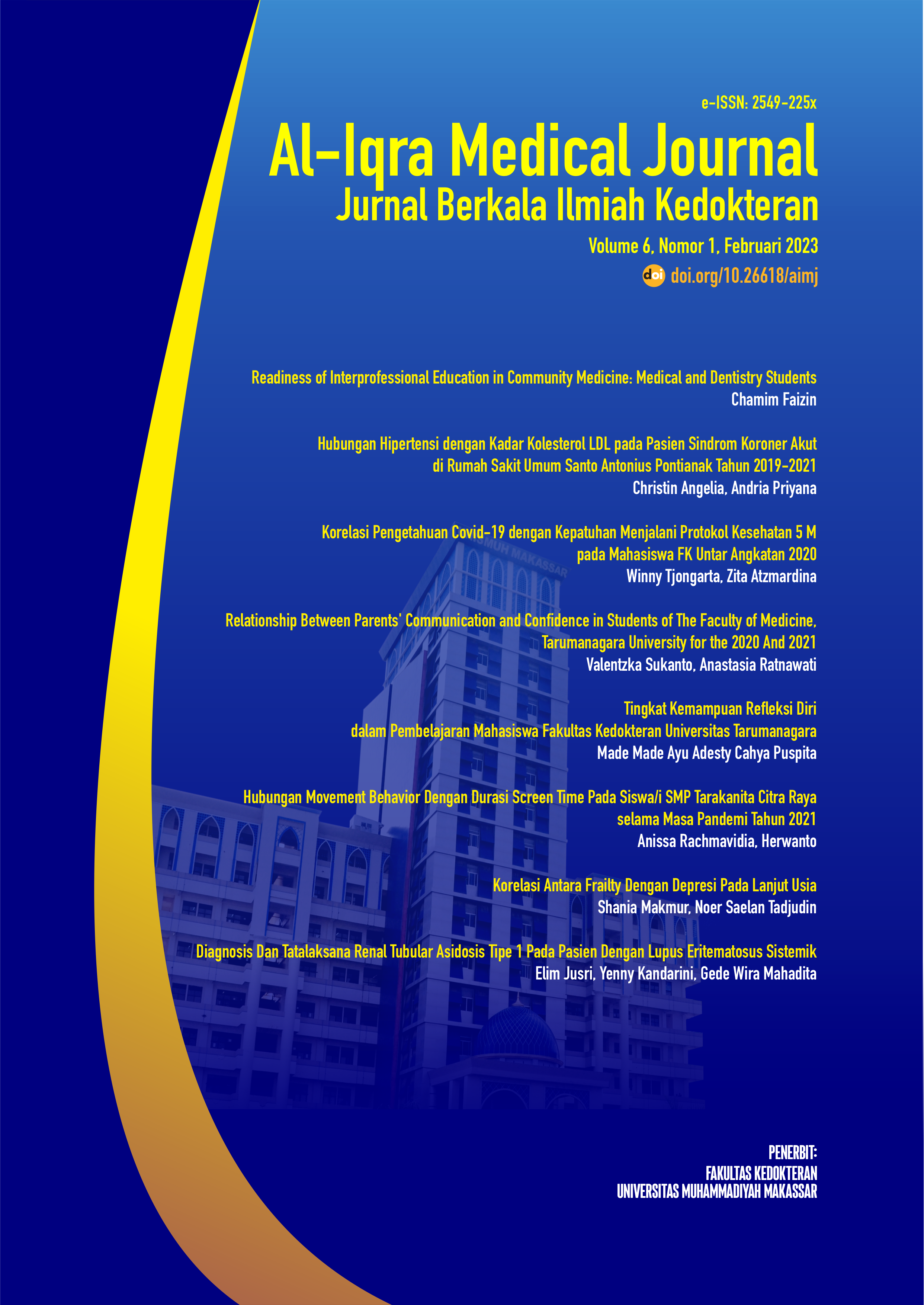KORELASI ANTARA FRAILTY DENGAN DEPRESI PADA LANJUT USIA
DOI:
https://doi.org/10.26618/aimj.v6i1.9096Keywords:
Frailty Syndrome, Depression, ElderlyAbstract
Elderly people in Indonesia are increasing in number and with increasing age there are changes such as threat of death, retirement, stressful life events or medical problems. It's normal to feel uncomfortable, stressed or sad about change. But if this feeling lasts for a long time, then there is a possibility of depression. Some people may experience depression after being diagnosed with a physical illness. Physical illness increases the risk of developing severe depression, so that there is a causal or mutually amplifying relationship in the comorbidity of psychological illness with physical illness. Frailty is theoretically a clinically recognizable state of increased susceptibility. Physical frailty and depression are common comorbid conditions that have an important impact on the elderly, so it is important to further research and confirm the relationship between frailty and depression to provide information and knowledge as a preventive measure and reduce the risk that can occur in the elderly. The study used a cross-sectional analytic study with a total population sampling technique. The study used the RAPUH questionnaire and the Geriatric Depression Scale (GDS) 15. The results showed that the elderly were classified as severe depression (6.2%), moderate depression (8.6%), mild depression (27.2%) and not depressed ( 58%). The elderly were also found to be frail (53.1%), pre-frail (44.4%) and robust (2.5%). Research on the relationship between frailty syndrome and depression scale was proven by Chi – Square test (P=0.000). The results of the relationship between frailty syndrome and depression scale were found to be P-value <0.05 so that in conclusion there was a significant relationship between frailty syndrome and depression in the elderly.
References
Kesehatan K. Hindari Lansia Dari Covid 19. KemkesGoId. 2020;
Raudhoh S, Pramudiani D. LANSIA ASIK, LANSIA AKTIF, LANSIA PODUKTIF. Med Dedication J Pengabdi Kpd Masy FKIK UNJA. 2021;4(1).
Sukmawati E. EFEKTIFITAS KONSUMSI BUAH PISANG AMBON UNTUK MENURUNKAN HIPERTENSI PADA IBU USIA REPRODUKSI SEHAT [Internet]. Vol. 2. 2017. Available from: http://2trik.jurnalelektronik.com/index.php/2trik
Fitriana F, Khairani K. KARAKTERISTIK DAN TINGKAT DEPRESI LANJUT USIA. Idea Nurs J. 2018;IX(2).
ABDUL AZIZ AZARI, MOHAMMAD ILHAM ZURURI. FAKTOR-FAKTOR YANG BERHUBUNGAN DENGAN DEPRESI PADA LANSIA. Med J AL QODIRI. 2021;6(2).
Hartutik S, Nurrohmah A. GAMBARAN TINGKAT DEPRESI PADA LANSIA DI MASA PANDEMIC COVID-19. J Ilmu Keperawatan Komunitas. 2021;4(1).
Sari CK. Hubungan Antara Sindrom Frailty Dengan Skala Depresi Paa Lanjut Usia Di Upt Pelayanan Sosial Lanjut Usia Dan Anak Balita Diwilayah Binjai Dan Medan Tahun 2016. Unisversitas Sumatera Utara. 2016;3(2).
Nathalia V, Elvira M. Terapi Kognitif Menurunkan Depresi Pada Lansia. J Kesehat PERINTIS (Perintis’s Heal Journal). 2021;7(2).
Alhawari V, Ayu Pratiwi. Study Literature Review : Pengaruh Efektivitas Terapi Aktivitas Kelompok Terhadap Tingkat Depresi Pada Lansia. J Kesehat. 2021;10(1).
Fitriana F, Khairani. Karakterristik dan Depresi Lanjut Usia. Idea Nurs J. 2018;IX(2).
Sukmawati E. wahyunita yulia sari, indah sulistyoningrum. Farmakologi Kebidanan. Trans Info Media. 2018;
Sugiyono. Metode Penelitian Kuantitatif, Kualitatif, dan R&D. 1st ed. Bandung: Penerbit Alfabeta; 2019.
Sugiyono. Metode Penelitian Kuantitaif, Kualitatif dan R & D. Bandung: Alfabeta; 2018. 394 p.
Sugiyono. metode penelitian kualntitaltif, kuallitaltif,daln R&D. Jakarta: Alfabeta; 2017.

